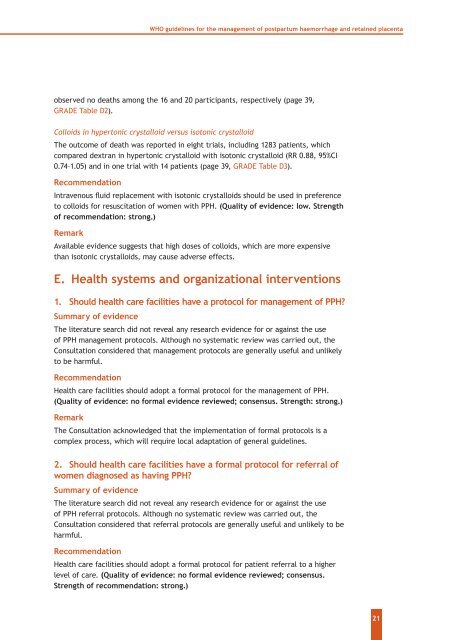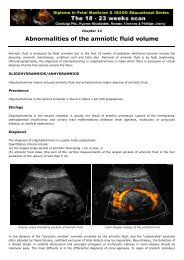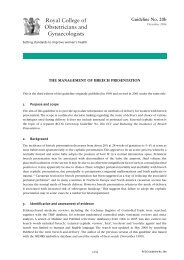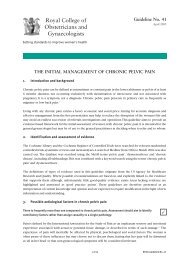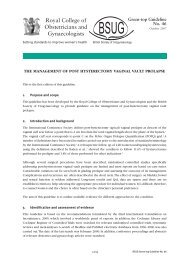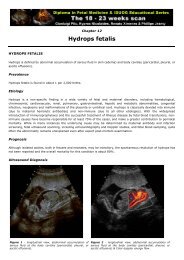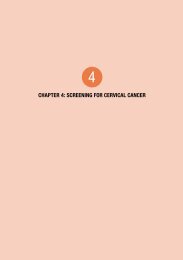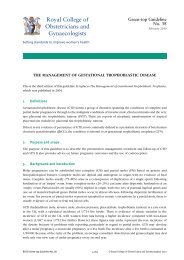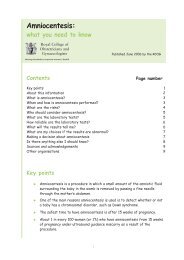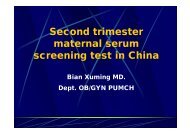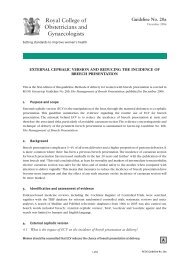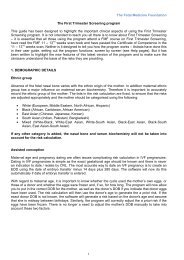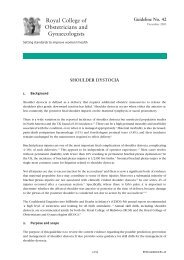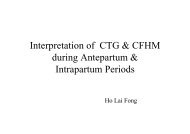WHO guidelines for the management of postpartum haemorrhage ...
WHO guidelines for the management of postpartum haemorrhage ...
WHO guidelines for the management of postpartum haemorrhage ...
You also want an ePaper? Increase the reach of your titles
YUMPU automatically turns print PDFs into web optimized ePapers that Google loves.
<strong>WHO</strong> <strong>guidelines</strong> <strong>for</strong> <strong>the</strong> <strong>management</strong> <strong>of</strong> <strong>postpartum</strong> <strong>haemorrhage</strong> and retained placenta<br />
observed no deaths among <strong>the</strong> 16 and 20 participants, respectively (page 39,<br />
GRADE Table D2).<br />
Colloids in hypertonic crystalloid versus isotonic crystalloid<br />
The outcome <strong>of</strong> death was reported in eight trials, including 1283 patients, which<br />
compared dextran in hypertonic crystalloid with isotonic crystalloid (RR 0.88, 95%CI<br />
0.74–1.05) and in one trial with 14 patients (page 39, GRADE Table D3).<br />
Recommendation<br />
Intravenous fluid replacement with isotonic crystalloids should be used in preference<br />
to colloids <strong>for</strong> resuscitation <strong>of</strong> women with PPH. (Quality <strong>of</strong> evidence: low. Strength<br />
<strong>of</strong> recommendation: strong.)<br />
Remark<br />
Available evidence suggests that high doses <strong>of</strong> colloids, which are more expensive<br />
than isotonic crystalloids, may cause adverse effects.<br />
E. Health systems and organizational interventions<br />
1. Should health care facilities have a protocol <strong>for</strong> <strong>management</strong> <strong>of</strong> PPH?<br />
Summary <strong>of</strong> evidence<br />
The literature search did not reveal any research evidence <strong>for</strong> or against <strong>the</strong> use<br />
<strong>of</strong> PPH <strong>management</strong> protocols. Although no systematic review was carried out, <strong>the</strong><br />
Consultation considered that <strong>management</strong> protocols are generally useful and unlikely<br />
to be harmful.<br />
Recommendation<br />
Health care facilities should adopt a <strong>for</strong>mal protocol <strong>for</strong> <strong>the</strong> <strong>management</strong> <strong>of</strong> PPH.<br />
(Quality <strong>of</strong> evidence: no <strong>for</strong>mal evidence reviewed; consensus. Strength: strong.)<br />
Remark<br />
The Consultation acknowledged that <strong>the</strong> implementation <strong>of</strong> <strong>for</strong>mal protocols is a<br />
complex process, which will require local adaptation <strong>of</strong> general <strong>guidelines</strong>.<br />
2. Should health care facilities have a <strong>for</strong>mal protocol <strong>for</strong> referral <strong>of</strong><br />
women diagnosed as having PPH?<br />
Summary <strong>of</strong> evidence<br />
The literature search did not reveal any research evidence <strong>for</strong> or against <strong>the</strong> use<br />
<strong>of</strong> PPH referral protocols. Although no systematic review was carried out, <strong>the</strong><br />
Consultation considered that referral protocols are generally useful and unlikely to be<br />
harmful.<br />
Recommendation<br />
Health care facilities should adopt a <strong>for</strong>mal protocol <strong>for</strong> patient referral to a higher<br />
level <strong>of</strong> care. (Quality <strong>of</strong> evidence: no <strong>for</strong>mal evidence reviewed; consensus.<br />
Strength <strong>of</strong> recommendation: strong.)<br />
21


